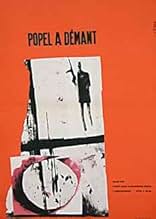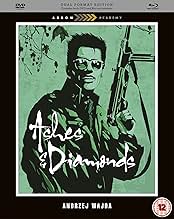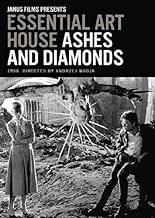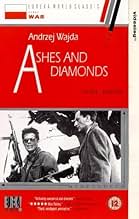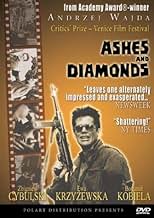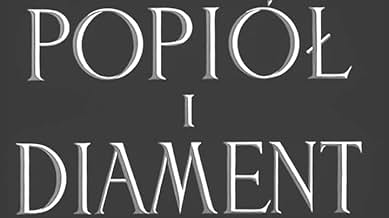À la fin de la Seconde Guerre mondiale et de l'occupation allemande, la résistance polonaise et les forces russes s'affrontent pour tenter de prendre le contrôle de la Pologne communiste.À la fin de la Seconde Guerre mondiale et de l'occupation allemande, la résistance polonaise et les forces russes s'affrontent pour tenter de prendre le contrôle de la Pologne communiste.À la fin de la Seconde Guerre mondiale et de l'occupation allemande, la résistance polonaise et les forces russes s'affrontent pour tenter de prendre le contrôle de la Pologne communiste.
- Réalisation
- Scénario
- Casting principal
- Nomination aux 2 BAFTA Awards
- 1 victoire et 2 nominations au total
- Stefka
- (as Barbara Kraftówna)
- Barmaid Lili
- (as Z. Czerwinska)
- Franek Pawlicki
- (as W. Grotowicz)
- Jurgieluszka
- (as I. Orzewska)
- Smolarski
- (as M. Loza)
- Puciatycka
- (as H. Siekierko)
Avis à la une
The visual composition of the film is as masterful as the complexity of the characters and plot. Despite the notoriously bad film technology in the Soviet states and the constraints of Socialist Realism, the film manages not only to capture the potential richness of black and white, but also manages to avoid the standard pitfalls of over-zealous editing that often destroy other contemporary Soviet films. The frames are longer shots in general, and forced schematization through editing is all but absent. The precise composition of each scene throughout the film provides the visual coherency that would otherwise be imposed by careful editing; as an example, see the scene in which Maciek is underneath the staircase in the lobby of the hotel towards the end of the film, or the final "Polish" dance scene.
I would highly recommend some research into the political transitions of Poland in the years directly following WWI before viewing this film for the first time; this film was made for a particular audience who clearly understood certain cultural and historical references that a modern Western audience will inevitably miss (ie. "Were you in Warsaw?"). The thematic and emotional complexity of the film is also enhanced by an understanding of Polish history. I would highly recommend this film for any class examining Eastern Europe or Soviet Russia (which is the context in which I was introduced to this film in particular), or to anyone who would like to better understand the complexity of Cold War politics from a perspective behind the Iron Curtain.
The film shows the lost youth of Poland struggling to find a way to leave this vicious upbringing and return to a normality which they often didn't ever have.
The film's hero wants to return to being a student and having romances and friends after years of fighting for the Polish underground (this is why he wears sunglasses, because his eyesight was damaged fighting in tunnels during the Warsaw Uprising), however he has a mission to kill a communist officer...
The film is amazing, the imagery reflects the detruction and sorrow of this lost generation. The direction and acting are superb. Like a previous poster, however, I was a little dis-satisfied with the ending, which differed from the book. That is a trivial point, though.
It's really the way how this movie looks that made this an interesting and good watch for me. It features some beautiful black & white cinematography and it has some some really strong and unforgettable images in it.
The story in itself is being kept deliberately small and simple. The movie very rarely dwells, which is a good thing but it at the same time also prevents this movie from making a truly lasting impression with a good or powerful story. In my opinion the movie was lacking this, which prevented me from truly regarding this movie as a perfect movie, or a must-see classic, even though it is generally being regarded as perhaps the best and most definitive Polish movie ever made.
Neverhteless, the characters all do work out well, due to the movie its story and overall approach. It was also truly a pleasure to watch Zbigniew Cybulski act, who is known as the Polish James Dean. He was truly great and really solely carried the movie, for most part.
Due to the fact that the movie is being kept simple and small, there is also very little to indicate in this movie that it's actually one being set during WW II. Don't know whether this was done intentionally or not but anyway, I liked that about this movie. It's a war movie without the war and everything that goes along with that and basically all that ever indicates that there is war going on is shown by the presence of a few soldiers.
A solid but above all things beautifully directed movie, by Andrzej Wajda.
8/10
http://bobafett1138.blogspot.com/
Le saviez-vous
- AnecdotesCitizen Kane (1941) - and Gregg Toland's cinematography in particular - was a huge influence on Andrzej Wajda at the time. Like Toland, the first thing the film's cinematographer Jerzy Wójcik did was convince production designer Roman Mann to include ceilings in all the sets.
- GaffesGlasses of vodka are set alight which burn for an unnaturally long length of time and with a bigger flame than expected, suggesting a purer fuel was used in the film, such as petrol. Moreover, when the final flame dies (c.41 minutes) no liquid remains in the glass. Only the alcohol content is flammable in any glass of spirit and a residue of water would be left behind with even the very strongest of Polish vodkas.
- Citations
Krystyna: Look. An old crypt. An inscription. "So often are you as a blazing torch with flames of burning hemp falling about you flaming, you know not if the flames bring freedom or death, consuming all that you most cherish. Will only ashes remain, and chaos whirling into the void." The letters are blurred. I can't read it.
Maciek Chelmicki: It's by Norwid. "Or will the ashes hold the glory of a starlike diamond, the Morning Star of everlasting triumph."
Krystyna: That's beautiful. "Or will the ashes hold the glory of a starlike diamond..." And what are we?
Maciek Chelmicki: You - are definitely a diamond.
- ConnexionsEdited into CzechMate: In Search of Jirí Menzel (2018)
- Bandes originalesCzerwone maki
(Red Poppies) (uncredited)
Music by Alfred Schütz and lyrics by Feliks Konarski
Performed by Grazyna Staniszewska
Meilleurs choix
- How long is Ashes and Diamonds?Alimenté par Alexa
Détails
Box-office
- Budget
- 6 070 000 PLN (estimé)
- Durée
- 1h 43min(103 min)
- Couleur
- Mixage
- Rapport de forme
- 1.66 : 1

